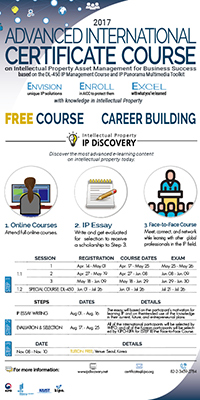First Blended Learning Course for Business Professionals
November 20, 2017
A four-day face-to-face training course on intellectual property (IP) management for business managers and professionals was held in Seoul, Republic of Korea from November 7 to 10, 2017. The training course was jointly organized by the WIPO Academy, the Korea Invention Promotion Association (KIPA), the Korean Intellectual Property Office (KIPO) and the Korea Advanced Institute of Science and Technology (KAIST).
25 IP managers and professionals, 12 of whom were women, from 18 developing and least developed countries participated in this edition of the blended learning training course. Three participants were WIPO Academy alumni, having graduated from the joint master’s programs with the University of Africa and the Africa Regional Intellectual Property Organization (ARIPO), and with the University of Turin.

What is blended learning?
The training course in Seoul was the final stage of a newly-applied blended learning approach that takes IP learners from the distance learning phase, to an IP essay, and lastly to face-to-face training. The three-step training course exposed participants to the impact of the effective management of IP assets on successful business outcomes through practical case studies, group discussions and lectures by renowned experts in the field.
The main objective of the course was to globally strengthen the knowledge and skills of small and medium-sized enterprises (SMEs) to create cost-effective policies, programs and projects that promote the power of IP assets in business strategies. With the knowledge and tools from the training course, SMEs can use IP to develop a substantial competitive edge in the marketplace.
The curriculum incorporates the latest international IP developments at WIPO and WTO in the field of IP management such as:
- IP Management and Economic Development,
- Open Source Licensing for Economic Development and
- The first amendment of TRIPS since 1994.
What our participants are saying
The participants had a very positive reaction to the training course:
This is one of the best courses I’ve taken. I learned a lot, especially during the exercises and even by simply talking to everyone here.
Christoper Cruz Gaelan, science research specialist at the Technology Application and Promotion Institute from the Philippines
The course allowed us to reach a deeper understanding of IP management which will be very useful in tackling different challenges in our home countries.
Ociel Esau Andrade Menses, patent substantive examination coordinator at the Mexican Institute of Industrial Property
The offline course was the opportunity to learn what happens next! Getting IP rights is only the first step to creating economic value for innovations. Thank you WIPO, KIPO, KAIST & KIPA because the interaction with IP experts from all over the world was priceless.
Gilda Margarita Alonzo Argueta, advisor at the Register of Intellectual Property in Guatemala
It's a high level course to gain practical and useful expertise in managing IP. Moreover, the instructors have the best competence in the world when it comes to this field, so the contents of the lectures as well as the lecturing techniques are the best in the world. Through this course I am able to perform IP management systematically and efficiently in actual businesses.
Jaeseok Kim, an advisor at Haim Bio from Korea
